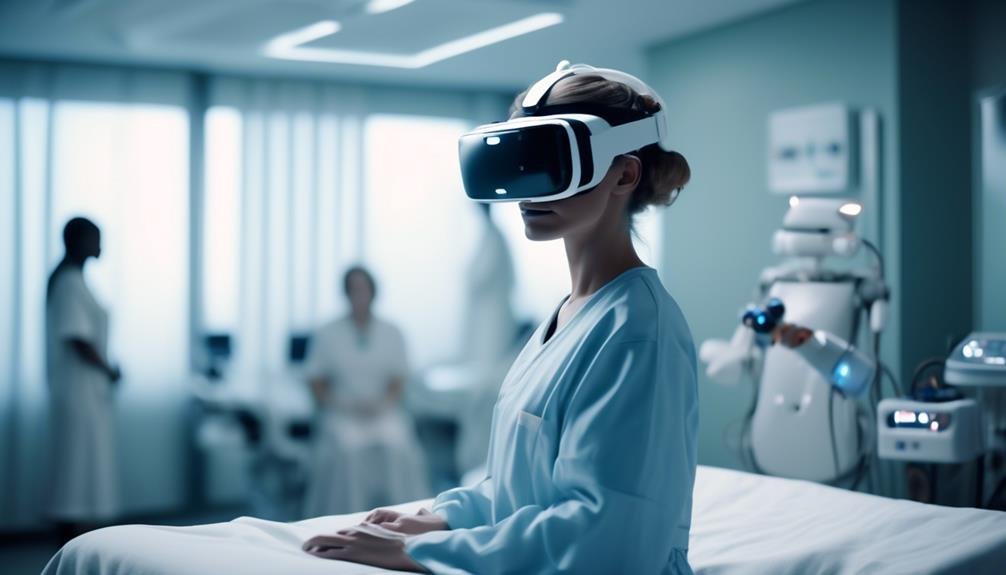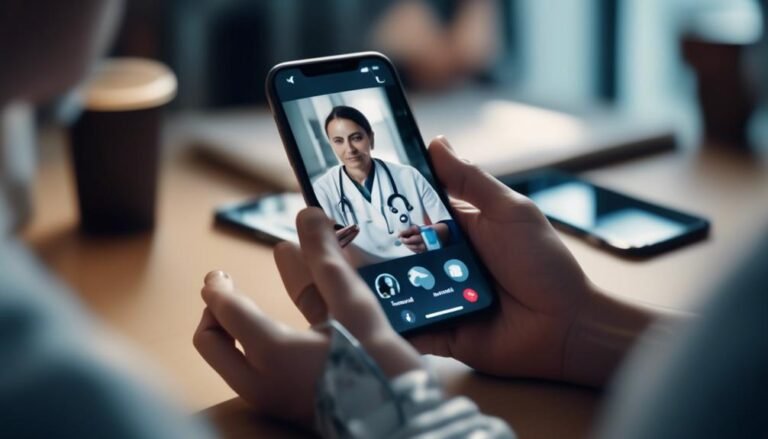Technology’s Edge: AI and VR in Enhancing Patient Experiences
In the ever-evolving landscape of healthcare, the integration of technology has brought about unprecedented advancements in patient care. Artificial Intelligence (AI) and Virtual Reality (VR) have emerged as powerful tools in enhancing the overall patient experience.
From personalized treatment plans to immersive therapeutic experiences, AI and VR are reshaping the way healthcare is delivered. The potential of these technologies to revolutionize patient-centered care is immense, offering new ways to educate, engage, and ultimately improve the well-being of patients.
As we explore the intersection of technology and healthcare, the impact of AI and VR in enhancing patient experiences cannot be overstated.
Key Takeaways
- AI leverages patient-specific data to tailor interventions and therapies, enhancing the efficacy and outcomes of medical care.
- VR provides immersive educational content and real-life medical simulations, leading to improved engagement and retention of information.
- AI and VR enable real-time monitoring of vital signs and symptoms, optimizing patient care.
- VR for pain management and anxiety relief offers non-pharmacological alternatives, improving patient comfort and well-being.
The Role of AI in Personalizing Treatment Plans
AI plays a crucial role in personalizing treatment plans by leveraging patient-specific data to tailor interventions and therapies, ultimately enhancing the efficacy and outcomes of medical care. Personalized diagnostics, driven by AI, enable healthcare providers to analyze a patient's unique genetic makeup, lifestyle factors, and medical history to identify precise treatment options. This approach allows for the customization of treatment strategies, ensuring that patients receive interventions that are specifically tailored to their individual needs.
One significant benefit of AI-driven personalized diagnostics is the ability to identify early indicators of diseases, allowing for proactive and targeted interventions. Through machine learning algorithms, AI can sift through vast amounts of patient data to recognize patterns and predict potential health issues, enabling healthcare professionals to intervene before conditions escalate.
Moreover, AI facilitates the continuous monitoring of patient data, enabling real-time adjustments to treatment plans based on individual responses and changing health parameters.
Enhancing Patient Education With VR
Virtual reality (VR) has revolutionized patient education by providing immersive educational content and real-life medical simulations. Through VR, patients can gain a deeper understanding of their medical conditions, treatment options, and procedures, leading to improved engagement and retention of information.
This innovative approach not only enhances patient education but also empowers individuals to make more informed decisions about their healthcare journey.
Immersive Educational Content
Using virtual reality technology to create immersive educational content has shown great potential in enhancing patient education and improving their overall healthcare experiences.
Interactive learning experiences in virtual labs allow patients to explore anatomical structures and medical procedures in a hands-on, engaging manner. Immersive training through VR simulations provides patients with a deeper understanding of their conditions and treatment options. This approach enables patients to visualize complex medical concepts, leading to increased comprehension and retention of information.
Furthermore, simulation environments offer a safe space for patients to experience different healthcare scenarios, empowering them to make informed decisions about their care. By integrating VR technology into patient education, healthcare providers can elevate the learning experience, ultimately leading to more informed and confident patients.
Real-Life Medical Simulations
The successful integration of virtual reality technology in creating immersive educational content for patients has paved the way for a significant advancement in healthcare through real-life medical simulations. Simulation technology allows medical professionals and students to engage in hands-on learning experiences within lifelike scenarios, leading to enhanced medical training and improved patient education.
Real-life medical simulations offer a safe yet realistic environment for practitioners to refine their skills, make critical decisions, and practice complex procedures. These simulations provide an invaluable opportunity for healthcare professionals to develop confidence and proficiency in a controlled setting before applying their knowledge in real-world patient care situations.
Immersive Therapeutic Experiences Through VR
Immersive therapeutic experiences through VR offer a promising approach to pain management and anxiety relief in healthcare settings.
By immersing patients in virtual environments, VR has the potential to distract individuals from their pain, leading to reduced reliance on traditional pharmaceutical interventions.
Additionally, VR can provide a safe and controlled space for patients to confront and manage anxiety-inducing situations, offering a novel tool for mental health treatment.
VR for Pain Management
Enhancing patient experiences through virtual reality (VR) technology offers innovative approaches to managing pain and providing immersive therapeutic experiences. VR for pain management has shown promising results in providing non-pharmacological pain relief by creating virtual environments that distract patients from their pain, reduce anxiety, and improve overall well-being. By immersing patients in interactive and engaging virtual reality experiences, healthcare providers can offer an alternative to traditional pain management techniques. The table below illustrates some key benefits of using VR for pain relief:
| VR for Pain Relief | Benefits |
|---|---|
| Distraction from Pain | Reduces focus on physical discomfort |
| Anxiety Reduction | Creates a calming and relaxing environment |
| Enhanced Well-being | Improves overall patient experience |
| Non-pharmacological Relief | Offers alternative to medication-based treatment |
| Personalized Therapy | Tailored experiences for individual needs |
Integrating VR into pain management represents a significant advancement in enhancing patient comfort and quality of care.
VR for Anxiety Relief
How can virtual reality (VR) technology be utilized to provide immersive therapeutic experiences for anxiety relief in healthcare settings?
VR offers a unique opportunity to create a virtual environment that promotes stress reduction and immersive relaxation, thus aiding in anxiety management. By immersing patients in a visually engaging and interactive virtual world, VR distracts them from real-world stressors, promoting a sense of calm and relaxation.
Research has shown that exposure to VR environments can significantly reduce anxiety levels and improve overall well-being. Healthcare providers are increasingly exploring the potential of VR as a non-pharmacological intervention for anxiety relief, particularly in scenarios such as pre-surgical anxiety, phobia treatment, and anxiety disorders.
The immersive nature of VR experiences has the potential to revolutionize anxiety management by offering a novel, effective, and personalized therapeutic approach.
AI's Impact on Patient-Centered Care
Artificial Intelligence (AI) has significantly revolutionized the landscape of patient-centered care, offering innovative solutions and personalized experiences for individuals within the healthcare system. AI's impact on patient-centered care is multifaceted, with its ability to harness data analytics for predictive insights, facilitate remote monitoring for proactive interventions, improve patient outcomes through personalized treatment plans, and enhance care coordination among healthcare providers.
- Data analytics: AI enables the analysis of vast amounts of patient data to identify patterns, trends, and potential health risks, leading to more accurate diagnoses and personalized treatment plans.
- Remote monitoring: Through AI-powered devices, patients can be remotely monitored in real-time, allowing healthcare professionals to intervene promptly and prevent potential health complications.
- Patient outcomes: AI contributes to improved patient outcomes by identifying high-risk individuals, predicting disease progression, and tailoring interventions to individual needs.
- Care coordination: AI streamlines communication and information sharing among healthcare teams, ensuring seamless coordination and continuity of care for patients.
The integration of AI into patient-centered care not only enhances the efficiency of healthcare delivery but also elevates the overall quality of patient experiences.
VR's Influence on Patient Engagement
The incorporation of Virtual Reality (VR) technology into healthcare settings has provided a groundbreaking platform for enhancing patient engagement and immersive therapeutic experiences. VR's influence on patient engagement is evident in its ability to empower patients through interactive and personalized experiences. By immersing patients in virtual environments, VR facilitates a sense of control and autonomy, which are essential aspects of patient empowerment. This technology allows patients to engage in activities that may otherwise be challenging or inaccessible, thereby promoting a greater sense of agency and involvement in their own care.
Moreover, virtual reality engagement fosters a heightened level of patient participation in their treatment plans. Through VR-based educational programs and interactive simulations, patients can gain a deeper understanding of their conditions and the proposed interventions, leading to more informed decision-making and increased compliance with prescribed therapies. Additionally, VR experiences can serve as a valuable tool for reducing anxiety and discomfort during medical procedures, thereby promoting a more positive and engaged patient experience.
Advantages of AI and VR in Healthcare
The transformative impact of incorporating Virtual Reality (VR) technology in healthcare settings is further augmented by the added advantages of AI, ushering in a new era of enhanced patient experiences and personalized care.
The following are some of the key advantages of AI and VR in healthcare:
- Remote Monitoring: AI and VR technologies enable healthcare professionals to remotely monitor patients' vital signs, symptoms, and medication adherence in real-time. This facilitates proactive intervention and personalized care, especially for patients with chronic conditions or those requiring long-term monitoring.
- Surgical Training: AI-powered VR simulations offer a safe and immersive environment for surgical trainees to practice and refine their skills. These simulations provide a realistic and risk-free platform for trainees to learn complex procedures, improve surgical techniques, and enhance their decision-making abilities.
- Personalized Treatment Planning: AI algorithms integrated with VR technology analyze patient-specific data to create personalized treatment plans. This empowers healthcare providers to offer tailored interventions, optimize medication regimens, and predict potential health risks, ultimately improving patient outcomes.
The integration of AI and VR in healthcare not only enhances patient experiences but also revolutionizes the delivery of care, making it more efficient, accurate, and patient-centered.
Conclusion
In conclusion, the integration of AI and VR in healthcare has revolutionized patient experiences by personalizing treatment plans, enhancing patient education, and providing immersive therapeutic experiences.
These technologies have significantly impacted patient-centered care and patient engagement, ultimately leading to improved healthcare outcomes.
The advantages of AI and VR in healthcare are vast, and their potential to transform the patient experience continues to grow, offering a glimpse into a future of healthcare that is both innovative and transformative.







